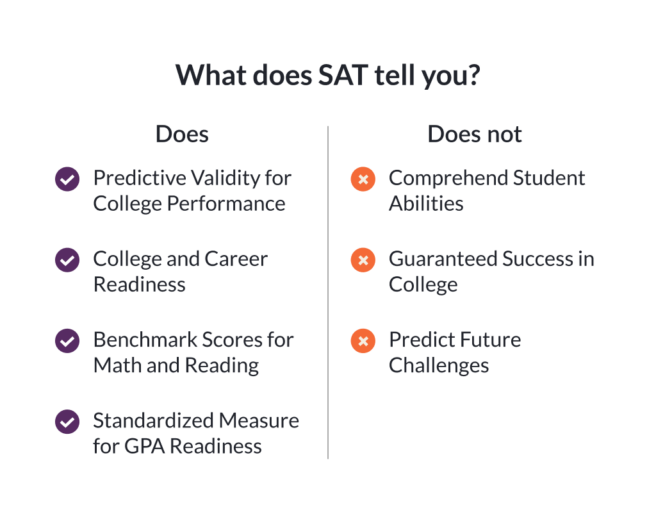By Dr. Sarah Thaler
“Is an 1120 on the SAT a good score?” It’s a question students love to ask, and honestly, it’s one with layers. As educators, we even struggle to give a straightforward answer. Keep reading to learn more about how SAT exams are scored and how Khanmigo’s AI lesson plans can help prepare your students for success on college entrance exams and beyond!
What an SAT score tells you
The SAT, developed by the College Board, is designed to gauge essential skills for college and career readiness. It has predictive validity, meaning it can forecast how well students are likely to perform in their first semester of college courses.
Surprisingly, the SAT is often a better, and more standardized, gauge of college readiness than a simple GPA calculation can offer. Meeting the benchmarks (a score of 530 on Math or 480 on Reading and Writing) indicates a 75% chance of getting a C or better in college courses like math, history, literature, social sciences, or writing.
Although many factors can affect a student’s SAT score, the work that teachers do to teach essential skills in classrooms can be a huge determinant of student success in standardized assessments.
What an SAT score doesn’t tell you
Educators know this better than anyone: scores don’t define everything.
They’re just one piece of the puzzle. Meeting the benchmarks doesn’t guarantee automatic success in every college class or in life.
Similarly, not meeting the benchmarks doesn’t spell doom. It does, however, highlight gaps in understanding that are crucial for post-high school success.
The SAT is designed to be reliable, meaning if students take it multiple times, they’ll likely get a similar score within a certain range. But simply retaking the test without addressing knowledge gaps won’t lead to improvement. And unfortunately, teachers often lack the time to differentiate for SAT prep alongside managing their state standards and district initiatives.
But don’t worry—that’s where Khanmigo comes in.

How Khanmigo’s AI teacher tools can help you prepare your students for the SAT
- Use the Official Digital SAT prep course, which has been developed with College Board, to help you understand the skills that will be assessed. Need to get students excited about solving problems using a graph or linear equation? Ask Khanmigo to write a lesson hook to engage students.
- Use the “Refresh my knowledge” tool in Khanmigo to explore test taking strategies to share with students.
- Khan Academy offers a Growth Mindset course, developed to help teachers and students understand how to learn from challenges. Want to incorporate growth mindset activities into your classroom but don’t know how? Use the lesson plan generator in Khanmigo to help you write a lesson plan!
- If students have already taken the SAT, PSAT/NMSQTⓇ, PSAT™ 10, or PSAT™ 8/9 and have scores available, use the Skills Insight™ tool to view statements that show what test takers in particular Reading and Writing and Math section score ranges typically know and can do. Use these statements to identify the skills that students need more help with and ask Khanmigo to write additional practice questions or lesson plans that highlight a skill.
Let AI lesson plans help you get all students to their post-grad goals
Again, we can’t say it enough: a test score doesn’t define anyone. But we do know that these scores can be a differentiating factor in making students’ journeys into college and adult life smoother. And with Khanmigo, teachers are equipped with the resources they need to help students master specific skills and gain admission to college.
Interested to try it out? We’ve got good news—Khanmigo Teachers is now free for all teachers, thanks to a partnership with Microsoft. Register here!